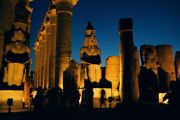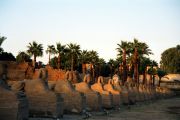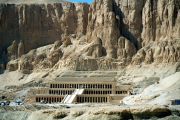The city of Luxor is one of Egypt ‘s most famous places. And for the Egyptians it is the most important one. Not only is it home to two incredible temples, but the other bank of the Nile had been chosen by the pharaohs of Egypt to be their eternal home.
|
I came to Luxor on the Nile cruise from Aswan. I came to see the city, the Karnak temple, right outside the ancient Thebes, and the Valley of the Kings. Karnak is the most important temple and monument in Egypt. It’s a gargantuan temple, which, at the time of its height, employed 80,000 people. It’s dedicated to the god Amun, the god of the Sun, almost equally important as Ra. The magnitude of Karnak surpasses every other pharaonic temple by far. It’s large enough to accommodate ten large European cathedrals. The Great Court, between the First and Second Pylons only could accommodate the entire St. Peter’s Cathedral of Vatican. And that’s only one of the courts! At Karnak, over 100 acres had been dedicated to the gods. For over 13 centuries, the pharaohs, one after another, contributed to this magnificent temple to add to its splendour, making it the most complex and spectacular temple of Egypt. Its First Pylon, 113 meters wide and 43 high is the largest pylon in Egypt, although it was never finished and remains undecorated revealing the brick structure. The temple is truly matchless and yet, there’s a single thing, or rather a large number of gigantic things that made the greatest impression on me. It’s the group of massive columns in the Great Hypostyle Hall, completed by Seti I and his son Ramses II. The hall itself is the largest of any temple in the world. 134 enormous columns stand in the hall, if I remember well. The hall is huge and yet the columns look like they had been tightly packed there, creating a forest of papyrus-bud decorated stone. Each column, if opened from the top, could fit eighty men. Some of the columns, still carry some of the colourful decorations on them. I tried to imagine how splendid this hall must have been some 3500 years ago. It’s overwhelming and breathtaking.
Karnak remains the most favourite and treasured place of the Egyptians. It’s recommended to spend a week to fully appreciate the temple complex. I had only one evening...
|
|
| Favourite spots: |
The modern city of Luxor is not very attractive. It’s a group of concrete ugly buildings erected without any architectural effort whatsoever. It’s a shame, because Luxor was once Thebes, the capital city of the unified kingdom of Egypt. 4,300 years ago, Luxor, combined with Karnak and the Karnak Temple, must have been the largest and most wonderful and outstanding city on the face of our planet - with its breathtaking temples, fantastic architecture, superb statues, magnificent alleys and incredible structures it was incomparable. Particularly on that scale. What’s remaining from those times is still jaw dropping, throwing people on their knees, taking breath away.
The magnificent Luxor Temple, whose walls tell the story of Egypt, myth-busting, was phenomenal. From its front pylon, a several kilometre-long alley of sphinxes was leading right to the Karnak Temple. Parts of the alley remain at both ends. Most of the sphinxes were ram-headed. Now lit beautifully at night.
|
|
| What's really great: |
 |
 |
 |
 |
 |
 |
 |
 |
Luxor Temple. Cleopatra's ghost.
 |
 |
The Luxor Temple is devoted to the god Amun, later joined with the Sun God, Ra, and worshipped as Amun-Ra, the most important god in Egypt for centuries. The Luxor temple however, was split to give room for three gods, including another combination of the superior god Amun, Amun-Min. The god Min was a harvest and fertility god, usually endowed with a massive erect phallus. The temple looks fabulous in the evenings when the lights are on, giving it a perfect golden glow. I was there in the right time, but sadly without a tripod, so I only took a small number of pictures. Yet still, I was able to capture some of the splendour and also the ghost of Cleopatra VII. I didn’t notice it at first, but on the picture beside, right under the feet of the statue of Ramses II there’s a figure of a woman, who mysteriously resembles Cleopatra VII. I’m no expert in these matters, but the shadow in question shouldn’t be there, because there’s no person obstructing the lamp in the front of the statue ;)
|
|
| Sights: |
There is an interesting fact about the Luxor Temple. This fact dates back almost 3,400 years after the temple had been built. The temple had two obelisks standing right in the front of the first pylon, but now there is only one. The other one is standing in Paris, at the Place de la Concorde. One day, the heads of state of France and Egypt made a swap. The Egyptians got a tower clock from Paris. This clock is now placed in Cairo, on the one of the towers of the Alabaster Mosque (Mosque of Muhammad Ali), and it does not work. It has never worked actually. The obelisk in Paris is taken a good care of, but I’m not sure if it’s right, and perhaps, the obelisk should come back to its original spot in Luxor. Today, the temple’s front is missing it so obviously. The symmetry is completely destroyed and it’s like a splinter in the eye.
Luxor has other ancient sights, but they look so insignificant compared with Karnak and Luxor temples. And yes, the Nile is a sight in itself, of course.
|
|
| Accommodations: |
And I lived on the Nile. During my visit in Luxor, I stayed at the flotel (floating hotel) that brought me from Aswan. I didn’t have to look for other accommodation in town. However, there were countless hotels and hostels ranging from hyper luxurious to rock-bottom basic. There was definitely something to fit any budget imaginable. For Luxor is one of Egypt’s most visited sights of all. Some of the stunning expensive hotels right by the river had lovely lush gardens and sophisticated courtyards sculpted to please the eye.
I heard that it was best to book the more expensive hotels through a local travel agent (there were heaps of them in towns frequented by tourists), who could often get much better deals. Same went for the Nile cruises and packages at one of the hundreds of flotels, whose quality varied from three to five stars. Like hotels. So, prices to stay on them would also vary.
|
|
| Nightlife: |
 |
 |
 |
 |
 |
 |
 |
 |
Sphinx Alley. Luxor's end
 |
 |
When the night fell, I should be theoretically spending it on the boat. However, a team of journalists from one of Polish newspapers, had an idea to hit to the town, and I happily joined them. First we went for shisha (see below). The second and the last stop was a discothèque. We definitely wanted to boogie a little. The problem was that it was well after closing time. This didn’t discourage us however to call at one of the posher hotels by the Nile and request for the disco to be opened for us. I was actually astonished they actually obliged. I thought it would’ve been a major challenge. We had a great time, and partied happily with a silly selection of music and double portions of tonic in our G&T’s.
The last task was to quietly smuggle the crew back on the flotel, as they were not supposed to go out with the guests, and night partying and drinking was absolutely and most definitely off limits for them. They could be fired and that was the last thing we wanted to happen to them.
|
|
| Hangouts: |
Shisha, a hookah–like water pipe is what all men in Egypt smoke while hanging out in shisha cafes. It’s actually quite pleasant and relaxing and has nothing to do with drugs or nicotine. What’s actually smoked are dried fruit, plum and mango being the most popular. I don’t smoke but maybe because of that, I was able to generate the thicker and larger smoke than anyone else. I don’t know what it is but shisha gives you a spin. Perhaps at very frequent intervals, a lot of air is taken to lungs and unusually large amounts of oxygen get to your blood and brain (?)
The shisha bar was an interesting spot and I quickly noticed that it might’ve been a popular place for locals and foreigners alike. We sat on couches and chairs upstairs by a window with no windowpane, looking down to the street. I think it was near the train station, but I can’t remember exactly. A few guys from the boat crew took us there, so I didn’t pay any attention to where I was going – I simply didn’t have to.
|
|
| Restaurants: |
I was dining at the flotel (it was a packaged deal) so I didn’t focus my attention towards eateries around the town. Yet it wasn’t hard to notice that Luxor had many cafes offering shisha and sweets, as well street food from simple stands. One would never walk hungry in town.
For decades, the history of Egypt and its monuments have been distorted by fantasists and sensationalists, probably triggered by many inconsistencies in the documentation about the country and its culture. There have been many myths broadcasted about the Egyptians, the temples, the pyramids, etc. further disfigured by Hollywood. And yet, when one speaks with the local Egyptologists, there is an answer for almost anything, to bust any myth, to explain every mystery. I spoke to my guide, Ahmed, who obliged to tell me the origins of Egypt, starting from the gods and their stories, lives and love affairs and ending with the methods of how pyramids and obelisks were built.
|
|
| Other recommendations: |
 |
 |
 |
 |
 |
 |
 |
 |
Hatsepsout Temple. Valley of the Kings.
 |
 |
The Valley of the Kings is the place of rest of many pharaohs. If I’m not completely wrong, the necropolis was always at the other side of the Nile than the city of the living. The left bank of the river, which was used for the necropolis. The valley with the royal tombs didn’t strike me that much, surprisingly. Yes, some of the tombs were interesting and it was fun to go deep under ground to see the burial and the sarcophagus chambers, the corridors meticulously decorated and painted with stories of Egypt and the life of the pharaohs, explaining the role of the gods and the Egyptian life.
The majority of the tombs have been already discovered and only few of them are still being looked for but archaeological work will continue for many years.
A more interesting fact about the valley that l learned was the profession of the royal tomb raiders. Although it sounds like a job from very recent and crazy times, it was a major profit making activity in the ancient times, actually.
|
|
Published on Saturday April 12th, 2008
|
|
 Publish on Facebook
Publish on Facebook
|
Tue, Jun 15 2010 - 11:07 AM
 by xolar
| Thanks for report - I love Egypt :) |
Fri, Apr 25 2008 - 01:02 AM
 by jorgesanchez by jorgesanchez
| Again you wrote a wonderful report |
Tue, Apr 15 2008 - 02:36 AM
 by ravinderkumarsi by ravinderkumarsi
| nice and superb report , remind me some of the reports by dav and rudi ,well done |
Mon, Apr 14 2008 - 12:11 PM
 by bootlegga by bootlegga
Mon, Apr 14 2008 - 01:28 AM
 by rangutan by rangutan
| GLOBO's #1 Egyptian report! |
Sun, Apr 13 2008 - 07:10 AM
 by marianne by marianne
| Very good and informative, pleasure to read |
Sun, Apr 13 2008 - 05:40 AM
 by davidx by davidx
| Excellent report yet again |
| Information: |
| Login if you are a member, or sign up for a free membership to rate this report and to earn globo points! |
|
| Switzerland |
|
|
 |
| Tanzania, United Republic of |
|
|
 |
| Thailand |
|
|
|
|
 |
| Togo |
|
|
 |
| Tunisia |
|
|
|
|
|
|
|
|
|
|
|
|
|
|
|
|
|
|
|
|
|

|
